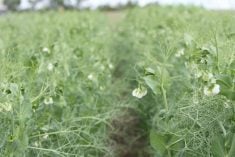Overseas policy changes are slowing a record canola export program to China.
Earlier this month, China’s National Development and Reform Commission reported that the price the government pays farmers to buy rapeseed for state reserves will be $600 per tonne, a 16 percent decline from last year’s levels.
The cost of Canadian imported canola after tariffs, freight and foreign exchange is $650 per tonne, eight percent higher than the price the Chinese government pays its farmers.
“It makes Canadian canola uncompetitive,” said Canola Council of Canada vice-president Dave Hickling.
Read Also

Phosphate prices to remain high
Phosphate prices are expected to remain elevated, according to Mosaic’s president.
The lower government price will push more domestic rapeseed to local crushers, displacing Canadian imports.
“That basically, in effect, would shut the door (to the Chinese marketplace),” he said.
The Canadian Grain Commission reports Canada shipped 1.9 million tonnes of canola to China during the first nine months of the 2008-09 crop year. Hickling said the industry will easily top two million tonnes by the end of July because shipments were still being loaded last week.
“That’s a record amount, so I guess we can’t complain too much,” he said.
“Frankly, China has done a really good job of stepping up and buying canola when we’ve had it to sell. We would have had a huge carryover with the resulting low prices if they hadn’t been buying.”
China’s stockpiling campaign will last until the end of September.
Hickling said a lot can happen between now and then to once again make Canadian exports competitive in that market, such as more favourable exchange rates and falling ocean freight rates.
One lingering frustration is the tariff rate disadvantage canola faces compared to soybeans. Canola imports are taxed at a nine percent tariff compared to three percent for soybeans, which amounts to a $25 to $30 per tonne disadvantage.
“That $25 on a tonne of canola can make a big difference,” Hickling said.
“It can make a difference whether we’re able to sell to China or we’re not able to sell to China.”
Reports of a looming record rapeseed harvest in China could also limit exports to that country.
In April, the U.S. Department of Agriculture’s Foreign Agricultural Service forecasted 12.7 million tonnes of production in 2009-10, up eight percent from the previous year. Reuters News Agency now reports production will surpass the 2004 record of 13.18 million tonnes.
Between China’s blossoming supply and the anticipated 20 percent decline in Canadian production, the 2009-10 export campaign is unlikely to rival this year’s record shipments.
“I don’t think anybody expects that we’ll be shipping another two million tonnes to China next year,” Hickling said.
“I don’t think that it will be too surprising if (China) heads back to more normal import levels.”















